#the subtlety in KGE's acting
Explore tagged Tumblr posts
Text
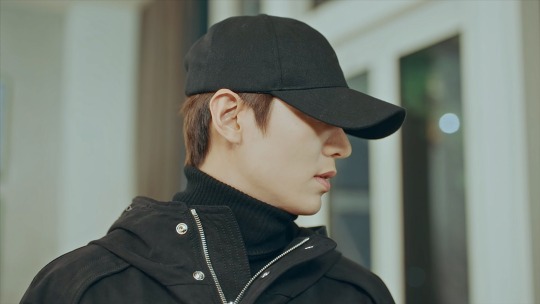
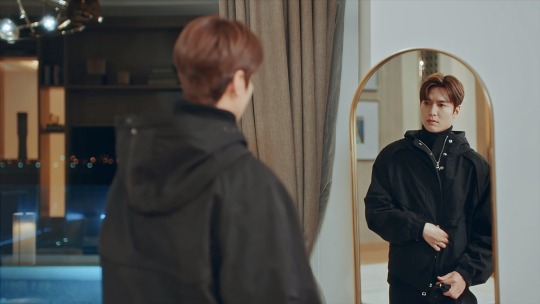





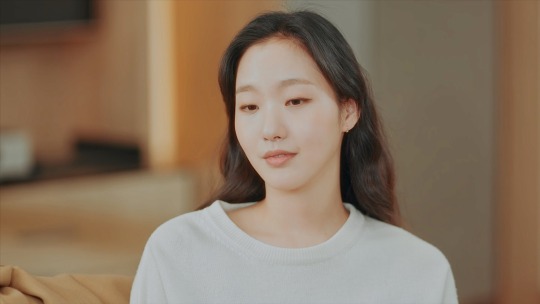


"I thought I wouldn't be fooled, but that face is my one weakness." "What do you mean?" "You have a look of anxiety. Something that Jeong Tae Eul doesn't have. You're not Jeong Tae Eul."
#the king eternal monarch#lee min ho#kim go eun#kdrama#TKEM ep 13#the subtlety in KGE's acting#luna pretending to be jeong tae eul#but not quite getting JTE's easy confidence#or her rapport with lee gon
31 notes
·
View notes
Text
Language subtleties and translation nuances - Part 1
@knight-of-tuxedo and @justhereforthepies recently did a post on translation differences between the English and French subtitles versions. Which led to a very interesting conversation with the two of them and @di-elle on how the show conveyed different meanings based on the way subtitles were written in each language.
My two cents under the cut ↓↓
Episode 2
So straight up from the beginning, Jung Tae Eul uses informal language (반말, banmal) when speaking to Lee Gon. This is corroborated through her body language and tone of voice, but from the English subtitles alone, you can’t really tell what level of formality she uses.
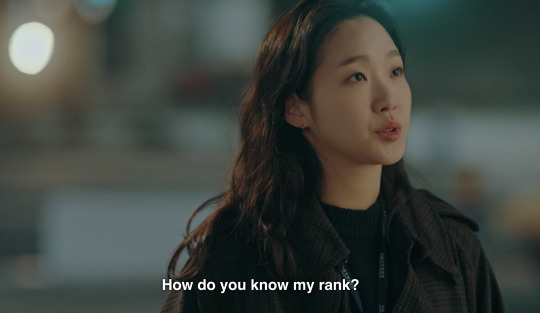
In the French subtitles however, they use the pronoun “vous” which is the formal way of referring to someone. Which is weird af. Why did they do that? I’m no translator so I’m sure they had their reasons, but using “vous” adds distance and doesn’t really convey the fact that Jung Tae Eul basically talks in a disrespectful way to a stranger. In Korean, it is usually quite rare for someone to use 반말 (informal language).
반말 (banmal) is reserved for childhood or very close friends of the same age, or couples (반말/banmal is not always disrespectful, it also conveys intimacy between two people.)
So the fact that she uses 반말 here adds emphasis and gives clues to her character and personality: headstrong, not intimidated, pissed and not impressed at all at this tall good looking stranger that just hugged her for no reason. These clues are completely disregarded in the French subtitles which straight up ignored the fact that she used an impolite way to express herself by choosing the pronoun “vous” in the translation.
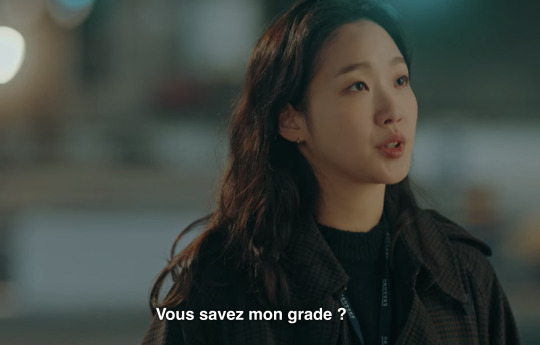
(Moreover, they translated this sentence to “You know my rank?” -- instead of “How do you know my rank”, but I guess that’s a detail).
As for Lee Gon, he uses a very stiff way of expressing himself. Not using “honorifics” nor speaking in a “deferential” way. He uses a plain (kinda polite, but plain) speech level, as if he would address someone close or younger than him. Again, in normal settings, a stranger would not speak this way to the person they’ve just met. They would use honorifics.
Cut to the scene at the police station:
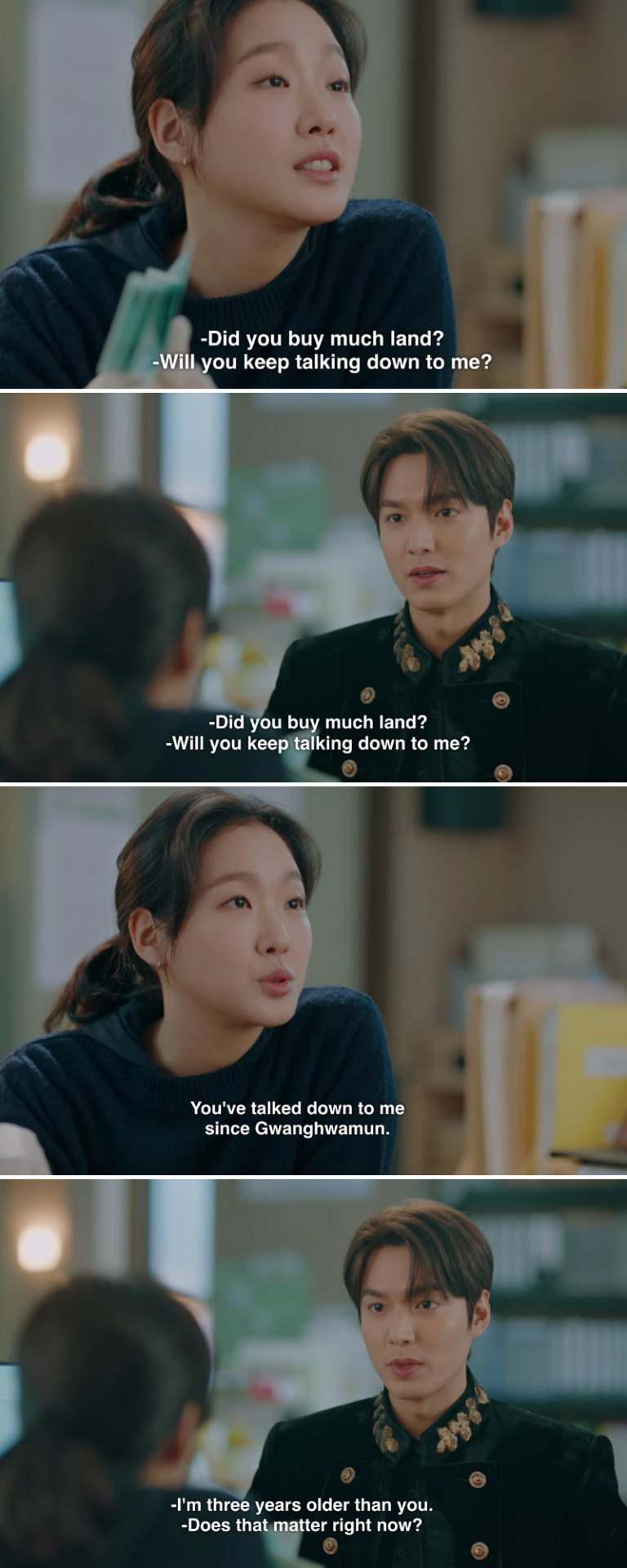
This is their first verbal sparring that made my heart flutter. Why?
- Tae Eul continues to use 반말 (again either very impolite or intimate. Given the context, it’s the former).
- Gon uses a neutral way of speaking but with nuances that tells the viewer he’s speaking down to someone.
- Seeing that Tae Eul uses 반말 (banmal), Gon asks: “Are we dropping the formalities?”
Here, the Netflix English translation says: “Will you keep talking down to me?”. But that ain’t right as LMH uses the verb “놓다” (nohta) which means letting go. So “dropping the formalities” would be, in my opinion, a more accurate translation.
- Tae Eul then interjects: “You’ve dropped / let go of the formalities since Gwanghamun.”
- To which Lee Gon replies: “내가 세살 오빠던데” (“Nae ga sae sal oppa deondae”) (legit fangirl moment). THIIIIIS. The inflection he uses, everything in his tone suggests he’s. making.a.point. Netflix translates this to: “I’m three years older than you.” which is meh because it doesn’t convey the true mood of Lee Gon.
Most of all, the translation is wrong, because if we want to be accurate in terms of his attitude and the words he actually uses, it would be:
“As I recall, I’m three years your Oppa [senior].”
He uses the word “oppa”.
He could’ve actually used the word “senior”, but he uses “oppa”. Why is that important? Because here, it implies in-ti-ma-cy. He uses “oppa” in the sense of what a girl would call her (older) boyfriend.
- Tae Eul finishes with “나는 외동이야” (”Na neun woedongiya”) (again, using very informal language). The subtitles says: “Does it matter right now?” but she actually says: “I’m an only child.” --> Tae Eul deliberately ignores Gon’s provocation and replies as if he was being literal. By replying “I’m an only child” she quips back and implies he’s not her Oppa. (Oppa also means “older brother” to a younger sister).
See?
The tone, the verbal back and forth. It gives depth to KGE & LMH’s acting, and adds to the dynamic chemistry of their characters.
Watch the clip again (starting at 1:17) and see how it makes all the difference.
youtube
#the king eternal monarch#tkem#lee min ho#kim go eun#lee gon#jung tae eul#kdrama#korean#linguistics#LANGUAGE#man it's beautiful :')#ramblings
63 notes
·
View notes
Text
THIS SCENE. I absolutely love this scene. He knew, like even though she had the same face, it did not take him long to figure it out.










"I thought I wouldn't be fooled, but that face is my one weakness." "What do you mean?" "You have a look of anxiety. Something that Jeong Tae Eul doesn't have. You're not Jeong Tae Eul."
#the king eternal monarch#the subtlety in KGE's acting#luna pretending to be jeong tae eul#but not quite getting JTE's easy confidence#or her rapport with lee gon#kdrama#i actually just watched this episode yesterday#lee min ho#kim go eun#jeong tae eul#lee gon#luna
31 notes
·
View notes